Download the 2017 Community Report (PDF).
50 years of health and well-being
In 2017, Wellington-Dufferin-Guelph Public Health celebrated 50 years of promoting healthy lives and preventing disease and injuries.
Today, Public Health is considered an essential part of the local healthcare system. There are many individuals whose good work is responsible for the success of Public Health and its acceptance by the broader community.
For instance, Dr. B.T. Dale, who was the first Medical Officer of Health of Public Health was a tireless advocate for public health practices.
An enthusiastic supporter of public health and an activist, he sought to bring public health principles into people’s lives, homes and communities.
“If we desire our nation to be great,” Dr. Dale said, “then the health of our people is the objective of greatest significance.”
Until universal healthcare was legislated in 1968, families often relied on local public health doctors, nurses and inspectors.
Health inspectors made communities safer by improving sanitation, approving septic tank installations, ensuring access to clean water and safe food, confirming milk was pasteurized and inspecting long-term care homes, Boy Scout camps and local pools.
Dufferin County Public Health Inspector, George Philips, reported that 1964 was his busiest year to date and added, “We must not, however, relax in our efforts to maintain this standard for only one carrier of disease, along with a faulty water or food supply, could cause the outbreak of an epidemic and its resulting effects.”
Director of Public Health Nursing, Helen Faskin, worked alongside Dr. Dale at Wellington County Public Health and later at Wellington-Dufferin-Guelph Public Health. In 1966 she described the primary objective of the public health nurse as, “… the prevention of illness, maintenance of health and promotion of healthy living through health teaching methods…”
From the beginning, the work of Public Health focused on building healthy families and communities. By 1958, Wellington Health Unit had established 11 child health centres throughout the county that served 8,466 children. “It is a great achievement,” Dr. Dale ascertained, “because it gives the best opportunity to young mothers, infants and preschool children to have good health supervision.”
As we begin our next 50 years, Wellington-Dufferin-Guelph Public Health’s role in local healthcare will continue to evolve and expand. But our work influencing people’s lives, homes and communities is rooted in the history behind our vision: everyone has the opportunity for health and well-being.
Click to skip to the following sections:
- Making healthy choices easier
- Welcome to the 2017 Community Report
- Public Health clinical services are for everyone
- 2017 Board of Health members
- Funding Public Health
- Making informed decisions to build better communities
- Radon gas: Every home is at risk
- Working with you for a brighter tomorrow
- Growing up healthy
- My Health eSnapshot
- Let’s Talk Parenting
- Consider safety when eating out
- Healthy menus
- How safe is your drinking water?
- Investigating food-borne illnesses
- Keeping safe from ticks and Lyme Disease
- Protecting residents from infection
Making healthy choices easier

Dr. Nicola Mercer, Medical Officer of Health & CEO
As Medical Officer of Health and CEO of Wellington-Dufferin- Guelph Public Health, I know being responsive to changing needs is a priority so that everyone has access to the options and information they need to stay well.
The vision of Public Health is that “everyone has the opportunity for health and well-being.” To help build that vision, Public Health looks at what is impacting the health of the community such as access to safe food and clean water and reducing harms from lifestyle choices including alcohol use and smoking.
Public Health also supports specialized services in partnership with trusted community partners like ensuring opioid users and their families and friends have access to Naloxone kits along with the training they need.
And as generations change, Public Health is reaching out in more ways. For instance, an online prenatal course is available through our website. Parents can access parenting and pregnancy advice through Twitter and Facebook, and online newsletters cover every stage of a child’s development.
Public Health is constantly seeking to improve the delivery of programs. That is why we are working with municipalities and private well owners to provide better access to testing so even more well owners can be sure the well water they drink is safe.
Public Health also works to influence provincial policy, resulting in changes such as the recent legislation requiring restaurant chains to display calorie counts on menus so diners have the information they need to make healthier choices.
Partnerships are key to fulfilling the Public Health vision. That is why we have built a unique and interactive source of data to support collaborative healthcare planning across the region. Public Health is an integral part of the local health system.
Working closely with the Central West and Waterloo Wellington Local Health Integration Networks (LHINs) ensures the Public Health perspective influences all aspects of the health system.
There are many more aspects to the work of Public Health. That work will continue to adapt to the societal changes that impact everyone wherever they live, work, learn and play.
Welcome to the 2017 Community Report
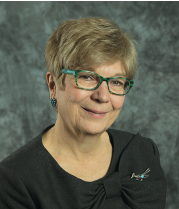
Nancy Sullivan, Board of Health Chair
The Board of Health for Wellington-Dufferin-Guelph Public Health is made up of local municipal councillors, mayors and community members who are responsible for the governance of Public Health.
The Board oversees the financial viability of the Agency and ensures that commitments to local residents are being met as required by the Ontario Health Protection and Prevention Act and the Ontario Public Health Standards.
In fact, new Ontario Public Health Standards were issued by the province for the first time in a decade in January 2018. The new Standards will broaden Public Health’s role in the local health system.
For example, Public Health is increasing its capacity to provide unique local data that shows each community’s context and drives better health planning. And we will respond to emerging issues such as climate change and the rise of diseases like West Nile virus and Lyme disease.
But what has not changed is our public health professionals’ commitment to ensuring residents are well-served and we’re responsive to local needs. Public Health continually:
- Inspects your favourite restaurant for safe food handling practices and inspects your preferred spa, tattoo or piercing establishment for safe infection control practices
- Ensures all students in school are fully vaccinated and the public has access to necessary vaccines
- Responds to public health emergencies such as drinking water contamination or the outbreak of infectious diseases
- Provides non-judgmental and inclusive clinical services around birth control, sexual health and travel health
- Supports healthier pregnancies, breastfeeding and positive parenting so healthier children grow up in healthy families
The Board of Health values the professionalism and dedication of all of the staff who develop and deliver Public Health programs. And the Board will continue to receive and discuss these activities over 2018 while ensuring the ongoing availability of resources, facilities and staff to help all residents stay as well as possible.
Public Health clinical services are for everyone
In 2017, close to 17,000 clients were served by public health nurses in clinics held at all Public Health offices.
The Public Health message is consistent: Get vaccinated! It is a safe and effective way to protect you and your family. The World Health Organization says each year vaccines prevent more than two million deaths around the world. In Canada, diseases like rubella and diphtheria have been virtually eliminated by vaccines. Measles, mumps and pertussis (whooping cough) have been decreased by 90-98 percent through vaccines.
Public Health also provides confidential services for both teens and adults if you want to talk to us about pregnancy, sexually transmitted infections or maintaining your sexual health. We also provide birth control prescriptions to women under 25 years of age. And you can get the emergency contraceptive pill (Plan B, morning after pill) at our clinics.
If you think you have a sexually transmitted infection (STI), don’t be shy, call us right away. Our nurses are non-judgmental and inclusive of all lifestyles.
STI testing and treatment are free. You can also get anonymous HIV testing and testing for hepatitis A or B.
If you think you are pregnant you can speak to a public health nurse, receive a pregnancy test and we can also refer you to other healthcare agencies.
Travel plans? Public Health Travel Clinics will advise you on the health risks and the vaccines you need depending on your destination. We will help you plan what to put in a travel medical kit and how to protect yourself from risks such as malaria, yellow fever and West Nile virus.
Find out more about our vaccines and clinics.
2017 Board of Health members
Nancy Sullivan
Chair
PA*, City of Guelph
Allen Taylor
Vice-Chair
PA*, County of Dufferin
Dennis Lever
Secretary – Treasurer
Warden, County of Wellington Mayor, Township of Puslinch
Dr. Nicola Mercer
Ex-Officio Member
Medical Officer of Health & CEO, WDG Public Health
Margaret Abbink
PA*, City of Guelph
William Baxter
PA*, County of Wellington
Christine Billings
Councillor, City of Guelph
George Bridge
Warden, County of Wellington
Mayor, Town of Minto
Cam Guthrie
Mayor, City of Guelph
Guy Gardhouse
Councillor, County of Dufferin
Mayor, Township of East Garafraxa
June Hofland
Councillor, City of Guelph
Lambert Otten
PA*, County of Wellington
Nancy MacDonald
PA*, County of Wellington
Ken McGhee
Councillor, County of Dufferin
Deputy Mayor, Town of Mono
Chris White
Councillor, County of Wellington
Mayor, Township of Guelph-Eramosa
* Provincial Appointee (PA)
Funding Public Health
In 2017, the total operating budget for Wellington-Dufferin-Guelph Public Health was $26,488,446.
Public Health receives funding from multiple sources:
- The Province of Ontario provides funding through the Ministry of Health and Long-Term Care and the Ministry of Children and Youth Services. In 2017, the Province of Ontario provided funding for 65 percent of the total operating budget ($17,181,306).
- The County of Wellington, County of Dufferin and City of Guelph provide funding based on the population of each municipality relative to the total population of the region. Population numbers are determined by the most recent Census. In 2017, the County of Wellington contributed 12 percent of the total operating budget ($3,142,018); the County of Dufferin contributed 7 percent ($1,751,301); and the City of Guelph contributed 15 percent ($3,832,283).
As a publicly funded organization, Wellington-Dufferin-Guelph Public Health reports under the accounting standards of the Public Sector Accounting Board (PSAB). The financial statements are subject to an audit by KPMG LLP.
Making informed decisions to build better communities
Wellington-Dufferin-Guelph Public Health is a community leader in local data collection, analysis and population health surveillance. Public Health uses local evidence to inform program planning, service delivery and policy development.
By gathering and monitoring information, Public Health can pinpoint neighbourhoods at risk and those that are thriving. This data informs decisions about the best ways to support health and well-being in any given community.
The Health Analytics Team at Public Health uses innovative technology to build tools to support healthcare decision making. Public Health is transitioning away from printed reports and towards online interactive reports.
Users can interact with these reports by viewing local data according to the characteristics they are most interested in such as geography, age, or gender. These reports are designed to be easily shared with community partners and can be updated quickly as new data becomes available.
As we continue to learn more about our local context, we use this information to ensure that everyone in our community has opportunities for health and well-being.
Radon gas: every home is at risk

Radon is the second leading cause of lung cancer in Canada, second only to smoking. For nonsmokers, that means radon gas is the leading cause of lung cancer.
Radon is a naturally-occurring gas that forms underground and seeps into homes through basement foundations and can build up inside a house. Testing is the first step to safety.
Recently, a resident told a local town hall meeting on radon gas and lung cancer that his wife had been diagnosed with lung cancer. Neither husband nor wife had smoked a day in their lives. Having found out how easily radon can seep into a home, they had their home tested and found that radon levels were high. They then hired a contractor to fix their home.
Test your home—if radon is high, fix your home. Both are easy to do, and you might save a life.
For more information, visit our Radon Testing page.
FAMILY HEALTH
Working with you for a brighter tomorrow

As our young children grow, they’re developing so much – physically, emotionally and mentally. Healthy development at these early stages of life are foundational to all future brain development.
Evidence shows that Adverse Childhood Experiences (ACEs), such as abuse, neglect or other forms of childhood trauma, can have significant negative impacts on a child’s development. ACEs are also associated with negative health behaviours and disease outcomes later in adulthood, such as a significantly increased risk of adopting smoking and alcoholism, as well as an increased risk of developing certain chronic conditions such as cancer, heart disease and diabetes. Public Health wants to intervene early to prevent these outcomes in adulthood.
Early life experiences shape brain development. When adults provide children with positive and stimulating early experiences, and reduce their exposure to ACEs, they help build a healthyfoundation for all future child development. Our goal is to give children the opportunity to experience and express a wide-range of emotions; develop close and meaningful relationships withother children and adults; and actively explore their environment.
Public Health is working with local partners to ensure programming addresses these key areas of development. We also work with parents, and future parents, to promote the social and emotional health of their children and families.
We can change the future for the next generation, to provide a brighter, healthier tomorrow.
For more information read the Board of Health Report on Promoting the Healthy Social and Emotional Development of Children (PDF).
Or, check out the Robert Wood Johnson Foundation infographic, The Truth About ACEs.
Growing up healthy
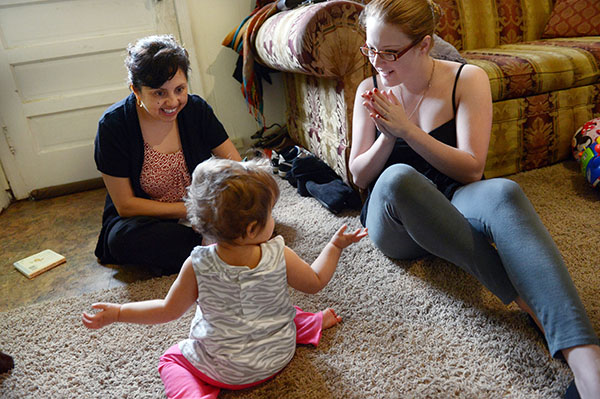
Every child should have the opportunity to achieve optimal development. That’s why our Healthy Babies Healthy Children (HBHC) program is so important.
During pregnancy and into those first few months of parenting, HBHC supports parents and caregivers to be healthy and ready to care for their newborns. We also help families parent during those busy and challenging early years. As part of this program, we provide:
- Screening and assessment during pregnancy, the newborn stage and early childhood
- Follow-up for families with additional challenges like isolation, financial hardship, lone parenting and mental health concerns
- Parenting support through home visits by a public health nurse and trained home visitor
- Intervention and service coordination for longer-term concerns
- Connecting families to other community resources or referrals
By helping parents lay the groundwork for a healthy family, we’re also promoting social and emotional health and brain development for the next generation.
We want everyone, especially those needing a little extra support, to have access to the resources needed to grow up healthy and happy!
My Health eSnapshot

About 50 percent of all pregnancies are unplanned. Waiting until pregnancy may be too late to prevent poor health outcomes for mother and baby.
Preconception health addresses health during the reproductive years. It promotes healthy fertility, healthy lifestyles and focuses on ways to reduce risks, whether or not someone plans to have children one day.
To improve preconception health, Wellington-Dufferin-Guelph Public Health developed an innovative risk assessment tool for women of reproductive age called My Health eSnapshot.
Patients use a digital tablet at their doctor’s appointment to answer questions about their health. It creates a dynamic picture of their health so they can make informed decisions about their future.
Here’s how it works:
- Women complete the health questionnaire on a tablet while waiting in their physician’s or primary care provider’s office.
- Results are synced with their personal electronic medical record (EMR).
- A discussion with their physician or primary care provider takes place, and women are provided with customized health messages on a handout to take home.
Our goal is to see fewer babies born too early, too small, or with birth defects. Public Health has just completed the first phase of research, and the results are promising. When first launched, we surveyed 300 participants:
65 percent said the tool made it easier to have a conversation with their physician
63 percent said they were motivated to make positive changes based on the results
While Public Health continues to conduct research to improve My Health eSnapshot, we are excited to see the early benefits of the program.
Let’s Talk Parenting
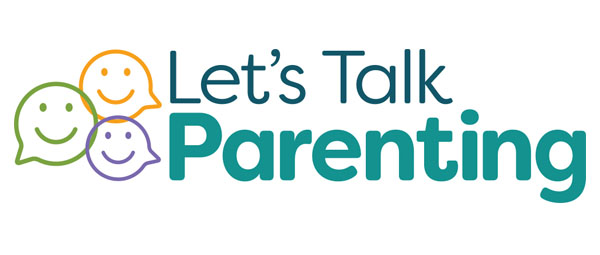
Let’s Talk Parenting offers free and confidential telephone support from a public health nurse about pregnancy, parenting and child health.
MONDAY TO FRIDAY, 9 A.M. TO 4 P.M.
1-800-265-7293 EXT. 3616
We can help you with:
- Pregnancy
- Postpartum adjustment
- Breastfeeding
- Mom and baby care
- Child health
- Parenting
- Healthy families
- Other public health services
- Community resources
Connect on Social Media
You can also connect with us online. Join the conversation on Twitter @LetsTalkParents and on Facebook @LetsTalkParenting.
Pregnancy and Parenting E-newsletters
Sign up with your email address to subscribe to our parenting e-newsletter full of reliable, local parenting information to help you and your family stay well. Each month will focus on an issue that affects children from birth to age 5. While some topics are universal, our focus will be on events and resources in Guelph and the counties of Wellington and Dufferin (and road trip distance beyond!).
Pregnant or thinking about having a baby? We have a newsletter for you too! Subscribe to our Let’s Talk Pregnancy newsletter.
Referrals to developmental services for children (0 to 6 years)
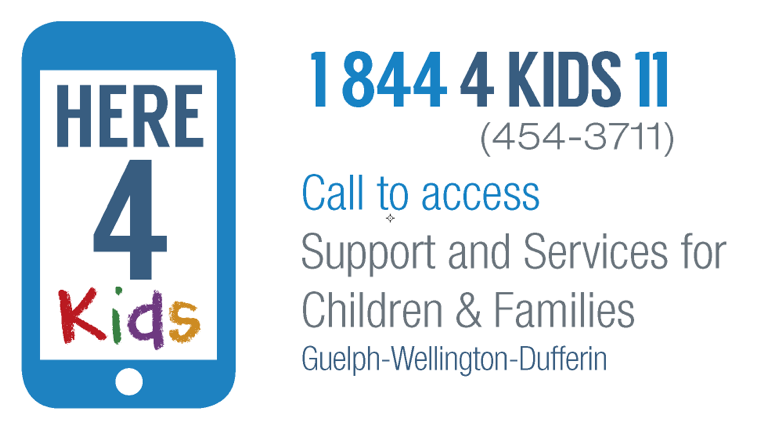
Here4Kids is the new access point for the Growing Great Kids System of Care. It is run by the Canadian Mental Health Association Waterloo Wellington and they can connect you with:
- Speech and language services
- Occupational therapy
- Physiotherapy
- Children’s mental health and developmental services
- Healthy Babies Healthy Children program
Call 1 844 4 KIDS 11 (1-844-454-3711) to get connected to a service coordinator.
HEALTH PROTECTION
Consider safety when eating out
Before you head out for your next dinner, visit Public Health’s inspection results website: www.checkbeforeyouchoose.ca.
On this site, you can see Public Health inspection results including any infractions and their resolution for restaurants and personal service settings (like hair salons and tattoo parlours) from our region.
New inspection results are added every day. Once inspection results are posted they stay online for two years, unless there is a new owner. If there is a new owner, inspection reports from
the previous owner are removed.
What does Public Health look for during an inspection?
- Food storage temperatures (hot and cold)
- Cooking, reheating and cooling times
- Employee personal hygiene
- Food production methods and procedures
- Flow of food through receiving, storage, preparation and service
- Dish/equipment washing and sanitizing procedures
- Pest control
- Methods of garbage collection, holding and disposal
- Cleanliness of floors, walls, ceilings, equipment and other surfaces
In personal service settings, public health inspectors check whether businesses comply with Infection Prevention and Control Best Practices including:
- Cleaning and disinfection of reusable instruments
- Sterilization of instruments or jewellery intended to pierce the skin
- Safe disposal of sharps (scalpels, needles, lancets, etc.)
- Proper disposal of single-use (disposable) items (e.g., disposable nail files, buffer blocks, wax applicators)
- Cleanliness of floors, walls, ceilings, equipment and other surfaces
- Whether verbal and written aftercare information is given, where applicable
- Management of blood-borne exposures
- Methods of preventing the spread of disease
- Hand hygiene
While we don’t endorse any specific businesses, we want to provide the public with the information needed to make smart choices and stay safe.
Healthy menus
As of January 1, 2017, all Ontario food premises with more than 20 locations in the province have had to display a Healthy Menu—one where calorie counts are listed for all standard menu items. These counts must appear on menus, menu boards, labels and tags.
Wellington-Dufferin-Guelph Public Health has 408 food premises where this applies. Public health inspectors are responsible for checking to ensure compliance so that the public can expect to see consistency in caloric information when eating outside the home. Making informed choices is the basis for this legislation so that diners can see the varying degrees of calories in specific foods and make healthier choices.
How safe is your drinking water?

Clean, safe drinking water is essential. Wellington-Dufferin-Guelph Public Health is committed to preventing or reducing the burden of water-borne illness related to drinking water.
Many residents get their water from a municipal supply system. The municipality is responsible for making sure it is free from contaminants. But if your water supply is from a well on your property, you are responsible for the quality of your own water.
Public Health urges residents who drink water from their own well to test it for bacterial contamination at least three times a year, especially in the spring, summer and fall. Unfortunately, most wells in Wellington and Dufferin Counties are not tested as often as they should be.
Public Health recently conducted a preliminary analysis of more than 30,000 local well water test results over a five-year period. This analysis revealed that one in five of the water samples showed evidence of bacterial contamination. Furthermore, approximately three percent of the water samples were positive for E. coli and unfit for consumption.
Well owners can have their water tested for free to determine if there is contamination from coliform bacteria and E. coli. Coliform bacteria are not necessarily disease-causing, but are tested as their presence is an indication that surface water may be entering the well and consequently the well may be compromised. However, E. coli can be the cause of illness with symptoms that include nausea, abdominal cramping and diarrhea.
Here’s how to get your well water tested:
- Pick up a sampling bottle from a Public Health location, Wellington County libraries, most municipal offices, as well as the Mount Forest or Palmerston hospitals and the Mapleton Health Centre.
- Follow the instructions that come with the sampling bottle for collecting, storing and transporting a water sample.
- Drop off your water sample at a designated location in Guelph, Orangeville, Fergus, Shelburne, Mount Forest and Palmerston. For a full list of drop-off sites and times as well as other information check out our well water testing page.
- Repeat in the spring, summer and fall (or more often).
The results are available within three days of being received by the lab (by phone or mail). Public Health is available to assist well owners who have questions about well water testing or who want help to interpret the lab results. For assistance, call 1-800- 265-7293 ext. 4753 to speak with a public health inspector.
Keep your family safe, ensure your water is fit for your family’s consumption. Please test your well water today!
For more information read the Board of Health Report: Public Health Well Water Research Project (PDF).
Investigating food-borne illnesses

Campylobacter at a Pig Roast
We want our communities to be safe from preventable illness and injury. So when, in spring 2017, Wellington-Dufferin-Guelph Public Health received notification of a local positive case of Campylobacter infection, and a second notification of a positive case from Waterloo, our team began an intensive investigation.
Both individuals had attended the same pig roast in Guelph.
From our investigation, it was revealed that 82 people attended this event. We interviewed most of them and discovered that 33 percent reported feeling ill after having eaten at the pig roast.
Public Health staff conducted an unannounced inspection of the catering facility hired for this pig roast. Inspection findings revealed a number of food-handling problems, including: hazardous food not being maintained at 4°C or lower during transportation; poor sanitary maintenance of the staff washroom; and insufficient general housekeeping to maintain the premises in a clean and sanitary condition.
We learned that this caterer had been preparing pig roasts nearly every weekend during the warmer months for a variety of events throughout the region.
Pig roasts are a common catering method for preparing and cooking large volumes of meat. Yet, this cooking style presents some risks. Food operators must be aware of how to preventpotential food-borne illnesses in those consuming the meat.
If contaminated meat is served uncooked or undercooked and the bacteria are not killed, people can become infected. Unfortunately, the number of Campylobacter bacteria required to make someone sick is very low. Symptoms typically occur 2-5 days after exposure and typically last a week. These symptoms can include diarrhea, cramping, abdominal pain and fever.
Public Health staff from the Environmental Health and Control of Infectious Diseases teams investigated this outbreak quickly to minimize any ongoing risk to the community. After the investigation Public Health worked with the vendor to ensure all food safety measures are understood and in place.
See all food vendor inspections at Public Health’s Check Before You Choose website.
Keeping safe from ticks and Lyme Disease

Ontario has seen an increase and expansion of the blacklegged tick population. In 2017, there were eight confirmed cases and one probable case of Lyme disease in our region alone. Wellington-Dufferin-Guelph Public Health works hard to protect our community and keep everyone safe.
Here are some important facts to remember about ticks and Lyme disease:
- Ticks do not run, jump, fly or move very quickly so you won’t find them falling from trees or jumping from bushes. Ticks usually hang around on thigh-high vegetation in wooded, brushy areas and are transferred to people when they are brushed up against. The tick will latch to your skin or your clothes and then search out an area where it can plug in. While ticks, theoretically, can be found just about anywhere, groomed outdoor areas like sports fields or playgrounds are not considered to be good habitats for ticks.
- Blacklegged ticks can carry the bacteria that causes Lyme disease, but not all blacklegged ticks are infected. An infected blacklegged tick must be actively feeding for at least 24 hours to spread the bacteria.
- Ticks can attach to any area of your body and be as small as a poppy seed. To make it easier to see ticks, wear light-coloured pants and a long-sleeved shirt while outdoors, and use an insect repellent with DEET or Icaridin. Perform daily full-body tick checks on yourself, your children, and your pets after coming indoors. If after being outside, say on a hike, you find a tick on your dog, check your skin more thoroughly—it may be a clue that you have walked through a tick habitat.
- The classic symptom of Lyme disease is a ‘bulls-eye’ red rash but it doesn’t appear in every case. Other symptoms of Lyme disease include a fever, headache, muscle and joint pain, and fatigue. These symptoms commonly start between three days and one month after being bitten by an infected blacklegged tick. Most cases of Lyme disease can be effectively treated with 2-4 weeks of antibiotics.
- You can submit ticks to Public Health for identification. Last year, we had 234 ticks brought to us for identification. If you find a tick, bring the completed form and the dead tick in a tightly sealed, transparent container into a Public Health office.
If you’ve been bitten by a tick or are concerned, please contact your healthcare provider.
For more information see our page on Ticks and Lyme Disease or our 2017 Tick and Lyme Disease Board of Health Report (PDF).
Protecting residents from infection

Wellington-Dufferin-Guelph Public Health investigates infection control complaints regarding any office of a regulated health professional as specified by the Ontario Public Health Standards.
We take complaints from the public very seriously. So when we hear about concerns regarding the cleaning of medical equipment we respond.
Some medical devices are reusable. Given this, there are specific standards that must be followed for cleaning, disinfection and sterilization of medical equipment (this is called reprocessing). If medical equipment is not properly reprocessed, these devices can be contaminated with blood or body fluids from the previous patient. If a virus like hepatitis B, hepatitis C or HIV survives inadequate reprocessing, it can be passed to the next patient on whom the device is used. This creates a potential risk for patients to acquire bloodborne infections.
Upon receiving an infection control complaint, a public health nurse and/or a public health inspector, trained in infection control, will conduct an unannounced inspection of the office.
The inspection looks for several things, such as:
- Re-use of items identified by the product manufacturer as being single-use
- Failure to clean and disinfect and/or sterilize re-usable equipment as per manufacturer instructions
- Failure to appropriately clean and disinfect surfaces that may come into contact with the intact skin of clients during a procedure
- Improper hand hygiene practices, including improper use of single-use gloves Public Health then works with the office to ensure staff are trained and a follow-up inspection will be done in an appropriate timeframe to confirm all practices are compliant with infection control best practices.
Public Health continues to offer education and resources to increase operator/practitioner awareness of best practices to reduce the risk of infection to our community. If you have any concerns or questions about your safety as it pertains to your health professionals, please call or visit our offices.
HEALTHY COMMUNITIES
Headwaters Food Charter

Public Health supports the Headwaters Food and Farming Alliance (HFFA) and is excited to share the new Headwaters Food Charter and Action Plan, a community vision for our local food system. So far, the food charter has been endorsed by eight councils in Dufferin County and Caledon and the support keeps growing.
Jennifer Payne, HFFA Farm to School Program Coordinator and Mono resident, reflected on how she got interested in the local food system.
“I started to educate myself about food when my children were born. I wanted to give them a good start in life and nourish their little bodies as best I could. I was surprised to learn how little I knew about what goes into making the food that is available to us, and the breadth of points of view on the subject of food and how it’s produced,” she said.
Jennifer is currently part of a dedicated team that delivers programs where local students can meet farmers and learn where their food comes from, bring home knapsacks filled with local food and are empowered with the skills to help prepare meals at home.
“The food charter captures all my wishes for a healthy food system. It really covers all the bases and brings food home on all sorts of key issues—it’s something that I think everyone can get behind and work toward,” Jennifer shared.
She sees the charter as a valuable community resource that connects people interested in learning about—and working on—local food.
“It was strong partnerships, a shared vision for a healthy food system and an engaged community passionate about local food issues that led to the successful creation of the food charter,” said Lisa Needham, HFFA chair and public health nutritionist at Wellington-Dufferin-Guelph Public Health.
“The food charter is for, and owned by, the Headwaters community,” Lisa emphasized. This collaborative effort involved input from businesses, farmers, municipalities, schools, community organizations and interested community members.
The food charter is an important conversation starter that uses food as a tool for community action. Stakeholder and community voices and priorities shaped the values, goals, and actions in the charter.
Six areas of focus:
- Food access and equity
- Agricultural sustainability
- Economic vitality
- Environmental responsibility
- Culture and celebration
- Health and well-being
“Our food charter will be instrumental in helping our community guide planning, policy, and program development in an effort to support a healthy food system,” Lisa said.
From growers to eaters, we all have a stake in shaping our local food system.
For more information see the Board of Health Report on the Headwaters Food Charter (PDF).
Or, check out the Headwaters Food and Farming Alliance website.
Immunizing our children
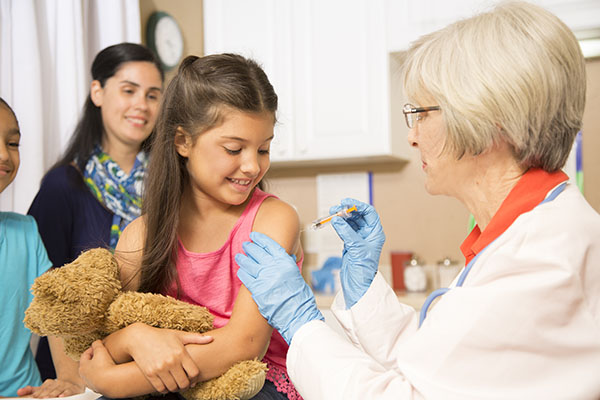
Schools are great institutions for learning—and for spreading germs. Wellington-Dufferin-Guelph Public Health keeps a close watch on schools to protect against an outbreak of diseases like mumps or measles. We need to know which students are vulnerable and need protection during an outbreak.
Public Health is responsible for knowing the immunization status of all students enrolled in local schools. In the 2016/17 school year, we sent 10,645 immunization notices to families whose children did not have up-to-date immunizations on record with Public Health. For students still not up to date after the advertised deadline, we issued 3,614 suspension orders letting them know they couldn’t attend classes until their immunization records were up-to-date with Public Health.
Over 85 percent of suspended secondary students and 95 percent of suspended elementary students returned to school within a week by receiving the required vaccines and updating their records. In the event a student did not return after a week of receiving the suspension order, public health nurses followed up with school principals and families to discuss individualized plans. Those who are unable to be immunized for medical reasons must file a medical exemption.
Those who are not immunized by choice can complete a legislated education session and file a Statement of Conscience or Religious Belief exemption.
Public Health and school boards must enforce the requirements of the legislation called the Immunization of School Pupils Act which protects the school community from nine serious vaccine-preventable diseases. We encourage parents to follow the recommendations of experts and immunize their children according to Ontario’s publicly-funded immunization schedule. Vaccines work best when they are given according to the schedule.
Preventing opioid overdose deaths

Opioid overdose deaths are preventable. Public Health is working to ensure individuals are prepared if they experience or witness an opioid overdose.
In Ontario, opioid misuse (including prescription and “street” drugs) is now the third leading cause of accidental death. This is a real concern in Ontario and our community is no exception to this crisis.
One critical component of preventing a fatal opioid overdose is the expansion of access to Naloxone. Naloxone is a medication that temporarily reverses the effects of an overdose from opioids (e.g., heroin, methadone, fentanyl, morphine, oxycodone). It can be injected into the body or sprayed into the nose.
Wellington-Dufferin-Guelph Public Health distributes and trains individuals on how to use Naloxone. Public Health also makes Naloxone available to community partners for distribution and training.
Training on overdose prevention, recognition and response (including calling 911, Naloxone administration, chest compressions and rescue breathing) saves lives and can prevent brain damage due to lack of oxygen in opioid overdose situations.
Studies show that the majority of overdoses happen in the company of others. When friends and family know how to use Naloxone they can prevent deaths and reduce the harm associated with overdose while waiting for first responders to arrive. As part of the Government of Ontario’s opioid strategy, Naloxone is now available free of charge for those at risk of opioid overdose and to those who are able to help someone at risk of an overdose (e.g., family members, friends, people who work with or interact with those at risk) at select pharmacies, community organizations, provincial correctional facilities across Ontario and from your local Public Health office.
Remember, overdose deaths are preventable and everyone can be involved in the solution— even if it is just becoming more aware of the issue and helping to reduce stigma and increase compassion for others.

